Updated
in 2019 and 2022
Leila Morrison
came ashore
at Omaha Beach, too
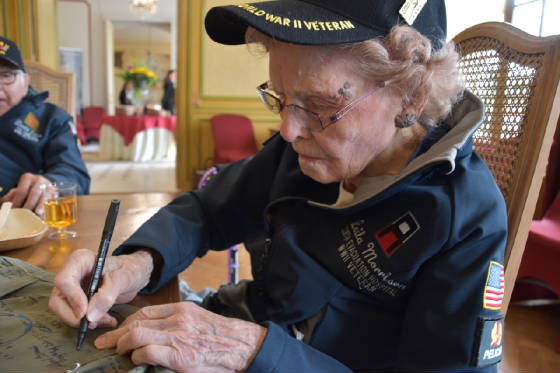
Leila Morrison in Normandy, signing the jacket of Best Defense Foundation program director
Ralph
Peeters, who lives in The Netherlands. (Photo courtesy Ralph Peeters)
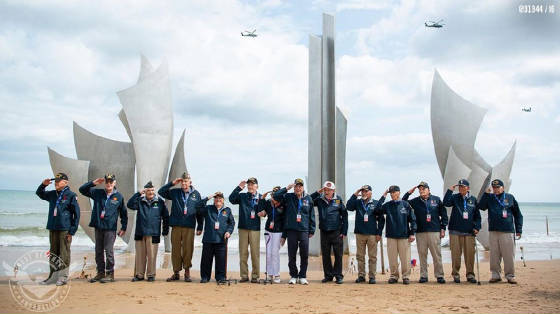
Leila Morrison is seventh from left (in white pants) among the Best Defense Foundation-escorted
veterans
on Omaha Beach. (Best Defense Foundation photo)
Also see a 95-minute 2014 interview with Leila Morrison by Brad Hoopes of Remember and Honor
NOTE: Leila Morrison passed away in Windsor on July 17, 2022.
On
June 6, 2019, the 75th anniversary of D-Day, Leila Morrison looked out over Omaha Beach.
"I just couldn't believe it,"
Morrison told me after returning to Northern Colorado. "It was so different from 75 years ago, when we arrived. There
wasn't anything recognizable except maybe the sand on the beach. It brought back so many emotions and everything else you
had inside of you."
Morrison is 97 and since 2010 has lived in Windsor, between Fort Collins and Greeley.
This often is
lost in the narrative, but Morrison (then known as Leila Allen) and other Army nurses came ashore shortly after the D-Day
landings and moved with the battle lines and the U.S. troops across Europe, working under trying conditions in operating "rooms"
that actually were triage tents. With the 118th Evacuation Hospital, she witnessed both the carnage of battle and, at Buchenwald
concentration camp, the results of the horrific actions of Nazi Germany in implementing the unspeakable "Final Solution."
Morrison
was the only woman among the 14 U.S. veterans of the Normandy campaign taken to France for the D-Day commemoration by the Best Defense Foundation, a remarkable organization
founded and run by former San Diego Chargers linebacker Donnie Edwards. The group sat on the stage at the official commemoration
ceremony. One of the group, Russell Pickett, as an 19-year-old private in the 29th Infantry Division was among the first to
arrive on shore, braving the German fire. French president Emmanuel Macron helped Pickett stand.

Leila Morrison with French children
(Best Defense Foundation
photo)
Leila Morrison was
sitting nearby.
"There are very few of us left from World War II," she said. "They told us while we were
there that we were probably the last World War II folks who would be there for a public ceremony, and it really was a big
one."
The commemoration ceremony was the highlight of the Best Defense Foundation's 10-day trip, which
also took the veterans to Paris and other and other French cities and sites.
"It was quite a trip, especially for an old woman,"
Morrison told me. "It's taken me longer to get over than I thought. It was a schedule for a teenager. But we made it
and I'm thankful I could. We were treated like royalty. The French people respected us and gave us every courtesy possible.
They were just happy to serve us. Even though it's three generations later, the people seemed to really be willing to remember
it and they're teaching their children about what happened. We went to a couple of schools and the children really welcomed
us and had made little banners. They seemed to know and understand quite a bit about World War II."
The Best Defense Foundation, which takes veterans back to the sites of their combat, came across her story and invited her on the momentous 75th anniversary
trip.
She met the group in
Los Angeles and they flew -- in First Class, thanks to upgrades from United Airlines -- to Paris and eventually ended up in
Normandy.

At Normandy, Leila
Morrison, center, is surrounded by
other Coloradans, from left: Julie Mann, Lilly Schroeder,
Brooke Moser, Quinn Schroeder, Carrie Vaughn.
(Photo courtesy Marc Moser)
Activists who support Edwards include Jake Schroeder, who is the head of Denver's
Police Activities League and sings the National Anthem at Avalanche games; and Avalanche television broadcaster Marc
Moser. They have become close friends of Ralph Peeters, the Best Defense Foundation's Netherlands-based program director.
Both Moser and Schroeder
were at Normandy for the 75th anniversary with their daughters and interacted with Morrison.
Morrison became beloved
among Best Defense Foundation personnel and charmed the young people meeting the American visitors.
"She was an inspiration and a
lovely lady to have on the program," Peeters told me. "She was an ambassador for all nurses who served in World
War II."
Anna Beker, another
Foundation program director involved with the trip, said Morrison "was the sweetest and nicest person there. An absolute
angel! All the boys loved her!"
Raised in Blue Ridge, Georgia, Morrison entered the Army Air Corps as a nurse after her graduation
from nursing school in 1943. Her training was at Lowry Field in Denver and Santa Ana Air Base, and then Camp Bowie in Texas. There,
she was shifted to the Army and soon was commissioned as an officer. Also while at Camp Bowie, she met a dashing Army officer
named Walter Morrison at a dance and turned down his virtually immediate marriage proposal, saying she couldn't get married
while a war was raging. But they remained in touch.
She was transported to Scotland on the coverted (and packed) Queen Elizabeth, went through additional
training and briefly was stationed in England before she was assigned to the 118th Evacuation Hospital. Then she and other
nurses traveled on a British ship, the Southhampton, to Omaha Beach.
Morrison said it was "a couple of months" after the D-Day
landings. The battle lines had moved on, but the goal was for the medical personnel in the unit -- including 40 doctors and
40 nurses -- to catch up.
"We could not come in very close, because of the mines and sunken ships still
there in the harbor," she said. "So we had to swing off this little, bitty ship on this rope ladder. Some GIs were
there in this little LST (Landing Ship, Tank) boat. I think that's the name of it. It opens up in the front. We went in on
that, and we walked out of it onto the beach. There was a two-and-a-half-ton truck there, and that's what we toured Europe
in, all the rest of the time. They took us down to a small town there in Normandy and then we proceeded on to where the lines
were to set up our hospital."
They moved through France, Luxembourg (in the Battle of the Bulge),
Germany and Czechoslovakia.
"It was all in tents," she said. "We lived in tents. The hospital was in tents.
It was all a bunch of tents with a big red cross on top."
(That was to identify it as a hospital, making it off limits for bombing
under international law.)
In tents, the unit treated the seriously wounded, hoping to get them alive to better facilities, usually
station hospitals. Yes, think a M*A*S*H unit -- but even more makeshift and more on the move.
"Our hospital
worked like a big emergency room," she told me. "We only took emergencies. If we thought a soldier would not make
it back to a station or a general hospital, we took them and brought them out of shock and stopped their hemorrhaging for surgery. We
gave many, many units of blood plasma. There was no preservation of whole blood at that time, so the next best thing was blood
plasma. It was a powder we had to mix with sterile water. We gave that to almost all of them."
When I asked her about following the battle lines, she responded: "Many times we didn't even know where we were.
It was a complete blackout, of course, and we traveled a lot at night. We'd say, 'Where are we?' And most of us would say,
'Well, I don't know. Somewhere in Germany or somewhere in France.'"
Eventually,
they arrived at Weimar, Germany and the site of the notorious Buchenwald concentration camp. It had just been liberated.
"Some things I
didn't believe," she said. "We pulled into the town and set up our tents and we were told that we would be moving
on the next day. Then they told us that evening, 'Buchenwald is just across the stret here, you could walk over there,' They
said, 'You girls be ready in the morning because we're going to have to go down there and help out.' The next morning, we
were ready to go and they came and said, 'You girls can't go today. The doctors are already down there and the conditions
are too deplorable for you girls. You have to wait until tomorrow.' So that's what we did.
"The next day we went down and they
had it cleaned up -- I guess that's what you would call it -- to a certain extent, and we saw things that I still have a hard
time believing. The poor people."
They saw the crematorium, stacks of bodies and emaciated survivors.
"The crematorium, they had it
worked out like a factory of murder," she said. "It was a two-story place and they had eight ovens on each side
of this brick crematorium."
After Germany's surrender and and after returning to the U.S., Morrison was told she would be deployed
in the upcoming invasion of Japan. But that nation surrendered in August 1945.
The storybook wartime romance had a happy ending.
Leila married Morrison, who served in George Patton's U.S. Third Army. They were married for 65 years before Walter's
death. Leila was a civilian nurse for 30 years, and she came to Windsor -- and the Good Samaritan home, where the French Legion
of Honor Medal ceremonly was held -- from Georgia to be near her son, Wally, and his family.
For many years, Morrison said, she
didn't talk much about her wartime experiences with anyone but he husband.
"The two of us could talk about it and understand,"
she said. "But just didn't talk to other people about it," she said. "I hear people say, 'Oh, my grandpa served,
but he wouldn't talk about it.' We didn't either, for years. We had two daughters and a son and my daughter asked years later,
'Well, Mom, why didn't you tell us some of it? You never mentioned it to us.' It was all such a horrible thing and my husband
and I could talk to each other. He understood. We had an outlet for the two of us because we could share it."

Leila Morrison is third from left in this shot from the May 2018
Honor
Flight Northern Colorado trip to Washington D.C. She's with
four women veterans from the Vietnam War
era and one from the Korean War era,
Earlier,
Morrison was one of 123 veterans who were part of the Honor Flight Northern Colorado trip to Washington D.C. in May 2018,
the next-to-last trip for that organization before it shut down in the wake of the death of Col. Stan Cass, its founder and
organizer, then was rebooted as High Plains Honor Flight.
Next,
in a February 2019 ceremony at her retirement home in Windsor, she was one of six World War II veterans with Colorado connections
who received the French Legion of Honor Medal for their service in Europe.
Other members of the Best Defense Foundation group
received the medal while they were in France.
Honoring
Morrison and the others was part of a labor of love for Donnie Edwards and the Best Defense Foundation, who earlier in the year escorted a group of surviving veterans to Iwo Jima.

Donnie Edwards on Omaha Beach with vet Pete Shaw
(Best Defense
Foundation photo)
The
group also visited cemeteries and laid wreaths. But it all came back to Omaha Beach, the focal point of the trip.
"When we first
pulled up, I looked out there at that big ocean," Morrison said. "It was a cloudy day. The wind was blowing. I thought,
'Oh, my goodness, how in the world did I ever have nerve enough to swing off the side of that ship?' I just couldn't believe
I had done that. Of course, 22 years old and 97 years old makes a little bit of a difference there."
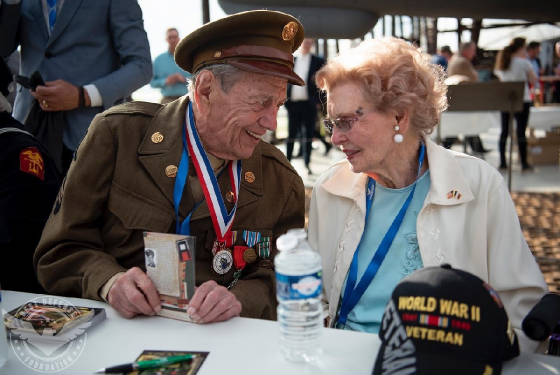
Leila
Morrison with fellow veteran Pete Shaw at Normandy
(Best
Defense Foundation photo)
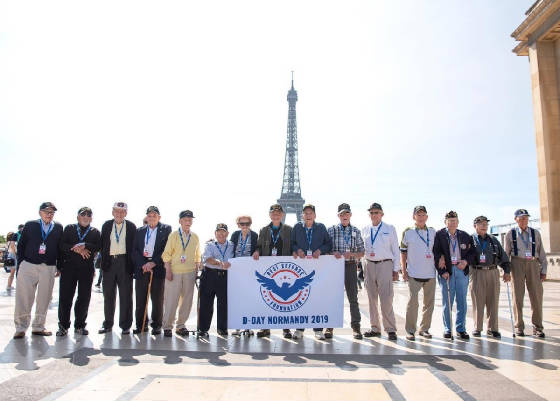
At the Eifel Tower,
Leila Morrison is seventh from left.
(Best Defense Foundation photo)
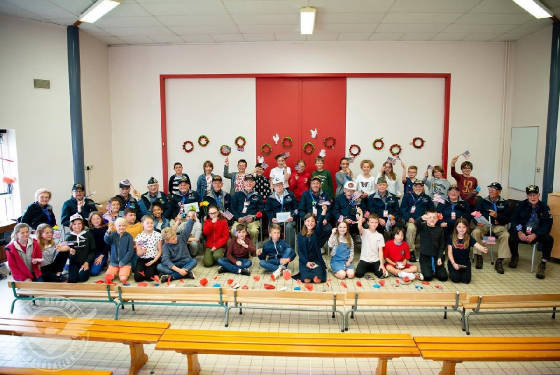
Leila Morrison and the other veterans on the Best Defense Foundation Trip at an
elementary school in Carentan. (Best Defense Foundation photo)








